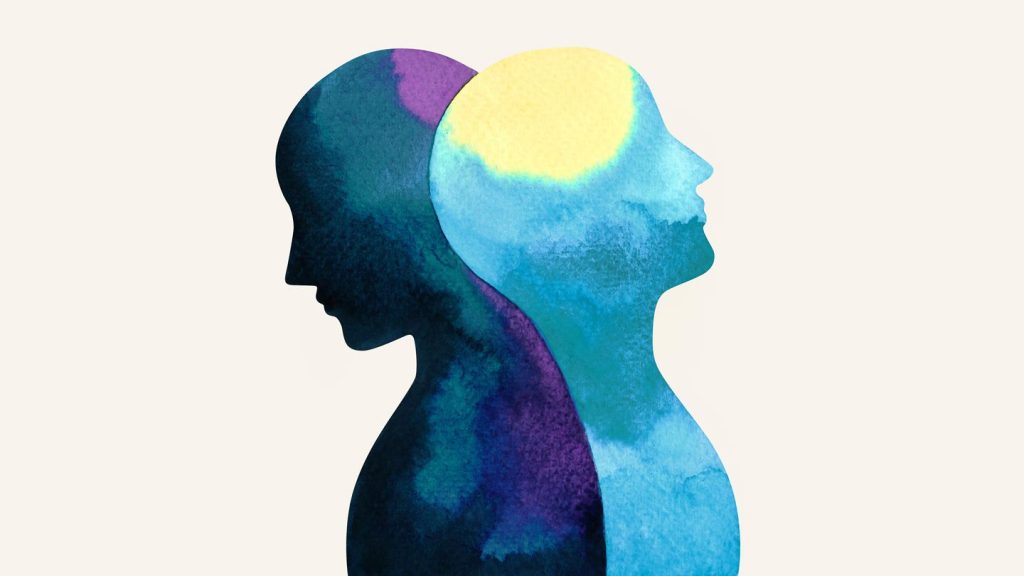Can Antidepressants Cause Mania?

Feeling invincible, impulsive, and endlessly energetic aren’t signs typically linked to depression — unless you may be experiencing antidepressant-induced mania linked to undiagnosed bipolar disorder.
Taking antidepressants may increase your chances of a manic episode in bipolar disorder but also in conditions that don’t typically feature the symptom — for example, major depressive disorder, if you have bipolar disorder that’s gone undiagnosed.
Not everyone taking antidepressants will experience mania.
Mania is a mood episode that presents with symptoms like agitation, elevated mood, and impulsivity. It’s primarily a formal symptom of bipolar disorder.
What are mania and hypomania?
Mania is a state of heightened mood, agitation, and intense physical and mental energy that can lead to major impairment in social or occupational areas of function. It can present in a number of ways, but often involves:
rapid speech
decreased need for sleep
feelings of grandiosity
racing thoughts
irritability
impulsivity
distractibility
Hypomania is a milder version of mania that involves some of the same symptoms but not to the point of causing significant impairment or keeping you from your everyday routine.
Mania after taking antidepressants
Antidepressants may increase the chances of an episode of mania or hypomania in certain people being treated for either unipolar or bipolar depression. That’s why some people say that antidepressants can make bipolar disorder worse. But it isn’t that simple.
While antidepressants are primarily prescribed for the treatment of major depressive disorder (unipolar or clinical depression), they may also be used to treat conditions featuring depressive episodes, like bipolar disorder.
In some cases, antidepressants are also used in the management of chronic pain, anxiety, and chronic insomnia.
Mania or affective switching?
During antidepressant treatment, shifting from an episode of depression to one that involves agitation is known as affective switching.
Some conditions, like bipolar disorder, are naturally characterized by cyclic affective switching. This means that people go through mood episodes in a given period of time. Antidepressant-induced mania isn’t part of the bipolar disorder cycle.
When you live with depression, you don’t go through mood episodes, like in bipolar disorder. Your mood typically stays the same, particularly in untreated depression. This is why mania during depression treatment can be the result of undiagnosed bipolar disorder.
But if you experience antidepressant-induced mania during your depression treatment, do you still have major depression or is it now bipolar disorder? Maybe neither.
Some experts argue that experiencing antidepressant-induced mania can’t be properly classified under current diagnostic criteria for depression or bipolar disorder and should have its own subtype category in the list of diagnoses.
Mania in bipolar disorder
Mania and hypomania are formal symptoms of bipolar disorder.
Mania is not a formal symptom of depression, a condition defined as persistent low mood and inability to experience joy.
You may go through depressive episodes when living with bipolar disorder, but it’s the presence of mania or hypomania that defines this condition.
You can experience bipolar disorder without depression, but you can’t experience bipolar disorder without mania or hypomania.
Who is more likely to experience antidepressant-induced mania?
People already living with bipolar disorder are more likely to experience a sudden episode of mania after taking certain antidepressants. But not everyone with the condition.
A 2018 review of bipolar depression notes that antidepressant-induced affective switching appears more common among people who:
experience depression with mixed features
are on older generation antidepressants
have a history of substance use disorder
You may be more likely to experience antidepressant-induced mania if you:
live with bipolar I disorder
are receiving antidepressant monotherapy
already experience rapid mood cycling
Women, younger people, and those with a family history of bipolar disorder, may have an increased chance of antidepressant-induced hypomania, according to a 2020 unipolar depression review.
Which antidepressants are more likely to cause mania?
Research suggests the use of older generation antidepressants, known as tricyclics, may cause a greater chance of mania compared to modern antidepressant options.
Tricyclic antidepressants include:
doxepin
imipramine
amitriptyline
clomipramine
desipramine
nortriptyline
amoxampine
protriptyline
trimipramine
Common side effects of antidepressants
Antidepressant-induced mania is not considered a common side effect of antidepressants.
According to cross-sectional patient dataTrusted Source collected over a 2-year period, the challenges people may experience when taking these medications include:
indigestion
nausea
abdominal pain
diarrhea
constipation
sudden heat stroke
intense sweating
dry mouth
changes in sleeping patterns
diminished sex drive
changes in weight
Different antidepressants may come with side effects more common to their class.
Selective serotonin reuptake inhibitors (SSRIs), for example, are known to have common side effects of dizziness, anxiety, headaches, and restlessness.
Can antidepressants cause bipolar disorder?
There’s no scientific evidence suggesting antidepressants cause or trigger bipolar disorder.
Antidepressants may increase the chance you’ll experience an episode of mania if you have major depressive disorder when you also have bipolar disorder but haven’t yet received a diagnosis.
Experts have not reached a consensus on determining if this experience should lead to a new bipolar disorder diagnosis.
Currently, researchers are considering including a bipolar or depressive disorder subtype that may be specific to antidepressant sensitivity causing a manic episode.
Next steps
If you’ve been diagnosed with major depressive disorder, experiencing mania is not typical. Any moods related to elation, agitation, or grandiosity may be medication-induced or could mean you also have bipolar disorder.
If you live with bipolar disorder, you can also experience antidepressant-induced mania outside of your cyclic mood cycles.
While antidepressant-induced mania remains diagnostically controversial, mood stabilizers may help prevent this type of affective switching, regardless of the underlying condition.
Article resources
Barbuti M, et al. (2017). Antidepressant-induced hypomania/mania in patients with major depression: Evidence from the BRIDGE-II-MIX study. https://www.sciencedirect.com/science/article/abs/pii/S0165032717300290
Beaupre M, et al. (2020). Antidepressant-associated mania in bipolar disorder: A review and meta-analysis of potential clinical and genetic risk factors. https://journals.lww.com/psychopharmacology/Abstract/2020/03000/Antidepressant_Associated_Mania_in_Bipolar.11.aspx
Bipolar disorder. (2020). https://www.nimh.nih.gov/health/topics/bipolar-disorderTrusted Source
Dailey MW, et al. (2022). Mania. https://www.ncbi.nlm.nih.gov/books/NBK493168/Trusted Source
Gill N, et al. (2020). A review of antidepressant-associated hypomania in those diagnosed with unipolar depression—risk factors, conceptual models, and management. https://www.researchgate.net/publication/340175853_A_Review_of_Antidepressant-Associated_Hypomania_in_Those_Diagnosed_with_Unipolar_Depression-Risk_Factors_Conceptual_Models_and_Management
Gitlin MJ. (2018). Antidepressants in bipolar depression: An enduring controversy. https://journalbipolardisorders.springeropen.com/articles/10.1186/s40345-018-0133-9
Patel R, et al. (2015). Do antidepressants increase the risk of mania and bipolar disorder in people with depression? A retrospective electronic case register cohort study. https://www.ncbi.nlm.nih.gov/pmc/articles/PMC4679886/Trusted Source
Ramic E, et al. (2020). Assessment of the antidepressant side effects occurrence in patients treated in primary care. https://www.ncbi.nlm.nih.gov/pmc/articles/PMC7428926/Trusted Source
Table 2 list of antidepressants and their categorizations. (n.d.). https://www.ncbi.nlm.nih.gov/books/NBK36406/table/ch1.t2/

